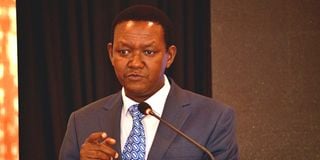Jua kali workers to save for pension in new plan

All workers in the informal sector will soon start saving for their retirement and access medical cover, among other benefits, from the expanded government-run social protection programme.
Once fully rolled out, the plan, whose implementation starts immediately, will see Kenya’s 16 million informal-sector workers also benefit from a strictly regulated minimum wage and their employers’ pension contribution— just like their counterparts in the formal sector.
This was revealed on Thursday by Labour and Social Protection Cabinet Secretary Alfred Mutua during the launch of a China-funded project on social protection in Nairobi.
The programme will see workers such as shop assistants, welders, barbers, cooks, waiters and butcher, whose jobs are precarious in nature, get more support to enhance their productivity.
“Exclusion in social protection interventions has led the informal sector to not access the existing social protection benefits and interventions, thus leaving the workers unprotected against risks and contingencies such as sickness, disability, maternity or old age as well as shocks caused by climate-related hazards such as drought, flooding and economic crises,” Dr Mutua said.
Currently, Kenya has about 3.9 million workers in the formal sector compared to 16 million in the informal economy— working in over five million informal enterprises in the country.
This number increases further with at least 6.4 million households in the country practicing agriculture to earn their livelihoods on an informal basis.
Social protection kitty
This new programme will see the government bringing in employers and employees in the informal sector to the social-protection kitty, with the government also adding to the coffers just as it happens in the formal economy.
Social Protection Principal Secretary Joseph Motari said the State Department was finalising data collection for an enhanced single registry for all workers in the informal and rural economy in the remaining 12 counties in the country.
This database, the PS explained, will play a crucial role in guiding interventions with accuracy.
“We have also transitioned from bi-monthly to monthly Inua Jamii cash transfer payments and by December, we will have fully migrated to mobile money disbursements through M-Pesa ensuring greater efficiency and accessibility,” he said, adding that the stipends being paid bi-monthly, will now be made monthly.
This transition, effective December 1, 2024, will help greatly reduce cases where the elderly are usually waylaid and robbed of their money shortly after receiving stipends at banks.
Whereas the beneficiaries of the cash transfer programme have increased from 1.2 to 1.7 million, Mr Motari said there remained a big gap in reaching workers in the rural and informal economy, something that they intend to fix “as soon as possible”.
On his part, China’s Vice Minister, Ministry of Human Resources and Social Security, Li Zhong said the South-South cooperation project, valued at $8.4million (Sh 1billion) was designed by China and the International Labour Organisation (ILO), and that it will expand the scope of social protection for thousands in the Kenya and Laos, which are the two main implementing countries of the project.
“This project is for supporting developing policies and regulations in the fields of employment, skills, development, social security, strengthening capacity building of public service institutions and personnel while promoting the digital transformation of the labour market,” he said.
For Caroline Mugalla, the ILO’s Country Office Director for, Kenya, Tanzania, Uganda, Rwanda and Burundi, the project would go a long way in helping the ILO achieve its target for the universal social protection and decent work for all, and in this case, in Kenya.
“This project will assist in ensuring that the people of Kenya live in dignity and are able to exploit their human capabilities to further their development and contribute to the economy. It also enables us to play a critical role in raising awareness about the right to social protection, improved digitalisation in social protection to enhance delivery mechanisms and extending coverage,” she said.





